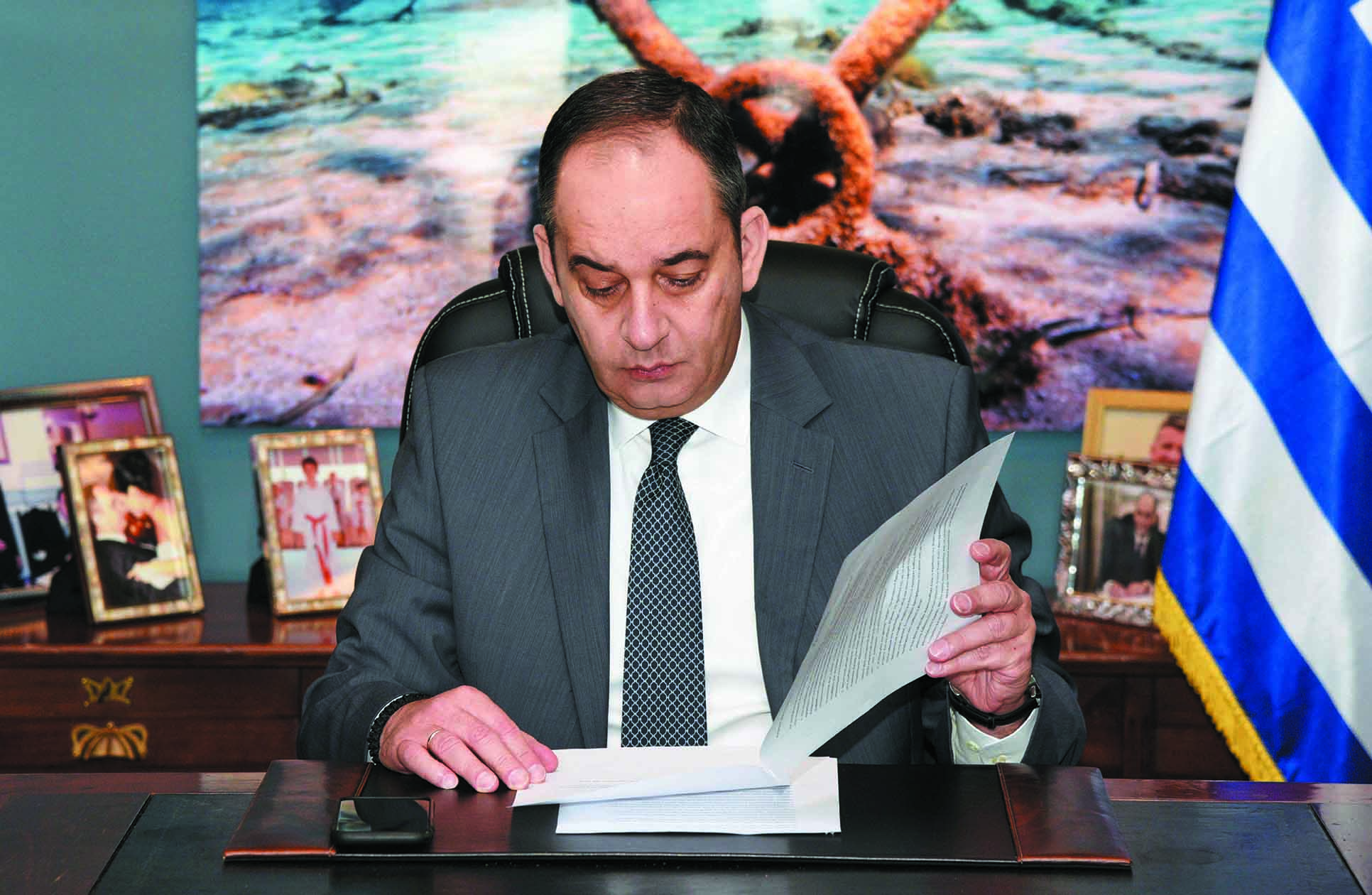INTERVIEW WITH THE MINISTER OF SHIPPING AND ISLAND POLICY, MR. JOHNNY PLAKIOTAKIS TO ANTONIS KIRIKOS
He leads a critical ministry for the country’s economy, visibility and security and has been called upon to deal with the consequences of COVID-19 in key areas. The use of
of the country’s major regional ports, the security of maritime borders and the upgrading of maritime education are the big bets for the Minister of Maritime Affairs and Insular Policy, Mr. Ioannis Plakiotakis, who declares his loyalty to his beloved Lassithi.
What are the main actions you have taken to limit the impact of COVID-19 in key areas such as shipping, maritime tourism, maritime employment and education?
From the very first moment of the pandemic, the Ministry of Maritime Affairs and Insular Policy has been working on three main axes, successfully dealing with today and
planning the next day.
1. Protecting, to the maximum extent possible, the health of islanders, with measures that have proven to limit the spread of the pandemic. In cooperation with the Ministry of Health, the EODY and the Civil Protection, these measures were implemented in time, so that today we have in our hands an extremely positive result, with very few cases overall in our islands and the vast majority of islands without any cases.
2. Support both our seafarers and the shipping companies. I remind you of the provision of a special purpose allowance for seafarers, the extension of the insurance capacity of unemployed seafarers, the aid of EUR 15 million to the shipping companies through the conclusion of public service contracts and the introduction of the possibility of an advance payment equal to 50% of the rents of these contracts. In fact, I reveal to you that, implementing a relevant directive of Prime Minister Kyriakos Mitsotakis, we are finalizing with my colleague, Finance Minister Christos Staikouras, a new package of support measures, which will be announced in the coming days.
3. Planning, in cooperation with the experts, of the relaunch of shipping, with the specific health protocols already in place.
You announced the receipt of floating ambulances reinforcing the health protection of the islands. They will remain in the services of the islander after the pandemic is over?
As you rightly pointed out, this is an important measure to strengthen the health protection of the islands, but also a measure to strengthen the sense of security of both islanders and visitors. Obviously the floating ambulances will remain on the islands.
Are you optimistic that soon we will see the ships with 100% occupancy?
From day one of the Protocol, I have stated that it will be kept under constant review, based on epidemiological data, but also on the consistency of compliance. This is what is being done. We monitor the data on a daily basis and discuss with EODY. We have already had the first revision of the Protocol, increasing the maximum number of passengers allowed to 60% (from 50%)
for ships without cabins and 65% (from 55%) for ships with cabins, as well as by increasing the limit to 2 (from 1) persons per cabin. As long as, as we all hope, the epidemiological data develop positively, we will continue to review the measures. We move forward consistently, we stay safe.
What is the most important problem you faced with in taking up your duties?
The “poor”, unfortunately, management of shipping and island policy issues by the previous government, which was content with piecemeal interventions, leaving problems to grow. The unacceptable delays in the investment in the port of Piraeus and in the National Integrated Maritime Surveillance System are absolutely typical examples, which have had a great cost for our country. Our aim, which is being implemented in rapid steps, is to make up for lost ground, but also to move forward with breakthroughs and reforms in the field of shipping and island policy. The investment in the port of Piraeus is progressing, since we approved the master plan in just three months. The National Maritime Surveillance System will be put out to tender in the next few days, we have changed the data in coastal shipping with a modern legislative framework, while we have prepared and will immediately post for public consultation a draft Law on Integrated Maritime Policy in the Insular Area. Through this, for the first time in Greece, the obligation of the State to draw up an integrated Island Policy is established. Fragmented interventions are giving way to a holistic strategic approach to Island Policy and the Maritime Economy.
What is the state of planning for the exploitation and sustainability of our country’s major regional ports?
Our aim is to complete the process as soon as possible. As you know, the evaluation studies have been completed by the Hellenic Property Fund and a consultant has been selected in order to launch international tenders for the selection of investors and optimal ways of developing each port. In this way, each port will become a pole of local development, with multiple benefits in terms of investment, job creation and increased trade at regional level, while, at the same time, social cohesion will be significantly enhanced. The general benefits for Greece will be very significant, both on an economic level, with the increase in public revenues, and on a geostrategic level, with the increase in international trade through our country.
How secure are our maritime borders, Minister, given that we have an unpredictable neighbour?
More than ever before. As you know, the reinforcement of the Coast Guard in terms of resources and personnel in the Aegean has increased its operational capabilities. The increased
patrols have led to a very large reduction in the number of refugees and migrants arriving in our country. Our decision is to continue applying the same strategic and operational direction. It is well known that Turkey is trying to use unfortunate people, refugees and migrants, to promote its geostrategic aspirations, while at the same time it is trying to cause tension and an incident in the Aegean Sea. I want to assure you that Greece has not played, is not playing and will not play the game that Turkey wants. The women and men of the Coast Guard guard our maritime borders with determination, calmness and sensitivity in relation to human life. Once again I thank them for their contribution.
What are your plans for the upgrade of the naval education?
The modernization and upgrading of maritime education is a priority for us, since this is the only way for Greeks to
seafarers will continue to play a leading role in a difficult and competitive market and Greek shipping will maintain its leading position in the world. The Ministry of Shipping and Insular Policy has proceeded in cooperation with the Eugenides Foundation and very soon we will have in our hands the overall strategic proposal for the upgrading of public maritime education in our country. In parallel, we have already established tele-education at the Merchant Marine Academies, with the active assistance of the Eugenides Foundation and Microsoft. The platform is used by 5,313 students and 277 teaching staff.

Your two favorite destinations in Greece and abroad?
One and forever my favorite destination. Lasithi. With its stunning natural beauty, history, tradition, amazing beaches, but also its mountains, with my always hospitable compatriots. Lasithi is for me a treasury of memories and a place of creation. The whole country and the whole world.
















